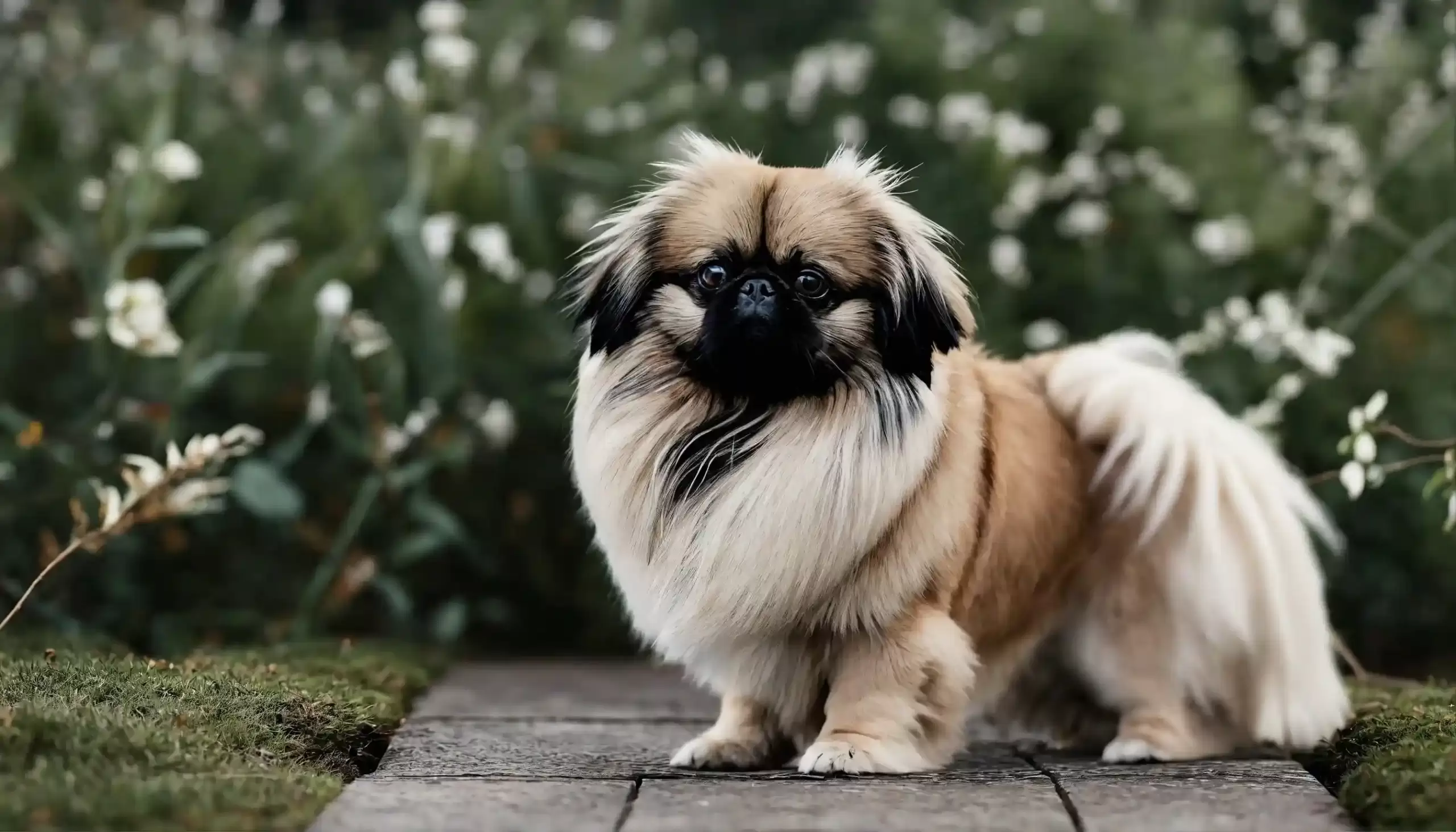The Pekingese dogs are adorable breed that turns heads wherever it goes, but did you know that caring for them goes beyond affection and walks? Your pet’s health and well-being depend on a specific care routine, especially when it comes to their coat and overall health.
Here, we’ll share the best tips to keep your dog always looking great and staying healthy. From grooming tricks to essential healthcare tips, you’ll learn everything you need to ensure a long and energetic life for your furry companion.
Whether you’re a first-time owner or an experienced one, these tips will make your daily routine with your Pekingese much easier. Let’s work together to make caring for your dog simple and enjoyable!
Grooming Your Pekingese: Essential Tips and Tricks
Proper grooming is essential for maintaining the health and appearance of your Pekingese. Here are some essential tips and tricks to keep your pet looking and feeling their best:
Grooming Tools
- Soft bristle brush
- Comb for removing tangles
- Dog-specific nail clippers
- Gentle dog shampoo
- Ear cleaning solution
- Toothbrush and dog toothpaste
Bathing and Drying
When it comes to bathing and drying, it’s important to use a gentle dog shampoo that won’t irritate the skin, along with lukewarm water to ensure a comfortable experience. Make sure to rinse thoroughly, as any leftover shampoo can lead to skin irritation, which is common in dogs with sensitive skin.
After the bath, drying is crucial to avoid any discomfort or health issues. Using a towel, gently pat your dog’s coat to absorb excess water, and if you opt for a hairdryer, ensure it’s set to a low heat to prevent overheating or drying out the skin.
Brushing and Grooming
Brushing: Regular brushing is important to prevent matting and tangles in your dog’s luxurious coat.
Facial Care: Use a damp cloth to gently clean around the eyes and wrinkles on the face.
Nail Care: Trim your Pekingese‘s nails regularly to prevent overgrowth and discomfort.
Coat Care
Coat Maintenance: Keep your dog’s coat healthy by providing a balanced diet and regular grooming.
Shedding: Pekingese shed minimally, but regular brushing can help control loose hair.
Professional Grooming
To keep the coat flawless, Pekingese grooming cuts are ideal for those looking for more specialized care. With precise trims and appropriate products, your dog will always have a healthy appearance. Professionals ensure results that avoid skin irritations.
In addition, this type of grooming helps prevent issues like tangles and dirt buildup. This brings more comfort to your pet and keeps their fur soft and clean.
Health Care Essentials for Pekingese Dogs
Health care for Pekingese dogs is crucial to ensure their well-being and longevity. Here are the essential aspects to consider:
- Regular Veterinary Check-ups: Regular visits to the veterinarian are essential to monitor your dog’s overall health, address any potential issues, and ensure they are up to date on vaccinations and parasite prevention;
- Proper Dental Care: Good dental hygiene is vital for dogs. Regular brushing and dental check-ups can prevent dental issues and maintain their overall health;
- Exercise and Mental Stimulation: Regular exercise and mental stimulation are important for dogs to maintain a healthy weight, prevent behavioral issues, and keep them physically and mentally active;
- Monitoring Breathing and Temperature: Due to their flat faces, Pekingese dogs are prone to breathing difficulties. Monitoring their breathing and avoiding overheating is crucial, especially in hot weather;
The Unique Needs of Pekingese: Understanding Their Health
When it comes to the health of Pekingese dogs, it’s important to understand their unique needs to ensure they live a long and healthy life.
Common Health Issues in Pekingese
- Brachycephalic Syndrome: Due to their flat faces, Pekingese can experience breathing difficulties and overheating;
- Eye Problems: This dogs are prone to eye issues such as corneal ulcers and progressive retinal atrophy;
- Orthopedic Problems: Their short legs make them susceptible to orthopedic conditions like patellar luxation;
- Special Care Requirements: Pekingese require special care due to their unique health needs. Regular veterinary check-ups and a watchful eye for any signs of discomfort are essential;
- Emotional Well-being: Pekingese thrive on companionship and can suffer from separation anxiety. Providing a nurturing and stable environment is essential for their emotional health.
Understanding and addressing the unique health needs of Pekingese dogs is vital for ensuring they lead happy and healthy lives.
Understanding Your Pekingese’s Dietary Needs
Proper diet and nutrition are essential for the health and well-being of your dog. As a small and unique breed, Pekingese have specific dietary requirements that need to be carefully considered.
- Small Breed Specifics: Pekingese are a small breed with a delicate digestive system. Their diet should be formulated to meet their unique nutritional needs;
- Protein Requirements: Pekingese require a diet with high-quality protein to support their muscle maintenance and overall health;
- Fat Intake: The breed’s diet should include moderate levels of healthy fats to provide energy and support their skin and coat health;
- Caloric Considerations: Due to their small size, Pekingese have lower caloric needs compared to larger breeds. Proper portion control is crucial to prevent obesity.
Choosing the Right Food for Your Pekingese
When selecting a commercial dog food or preparing homemade meals for your Pekingese, consider the following:
- High-Quality Ingredients: Opt for dog food that contains real meat, whole grains, and vegetables without artificial additives or fillers;
- Breed-Specific Formulas: Look for dog food specifically formulated for small breeds or toy breeds, taking into account their unique nutritional requirements;
- Consultation with a Veterinarian: Seek advice from a veterinarian to determine the best diet for your Pekingese based on their age, weight, activity level, and any health concerns.
Feeding Schedule and Portion Control
Establish a regular feeding schedule and practice portion control to maintain your Pekingese‘s ideal weight and prevent overeating. Avoid free-feeding and monitor their food intake to prevent obesity-related health issues.
Special Dietary Considerations
Pekingese may have specific dietary considerations such as food allergies, sensitivities, or dental issues. It’s important to address these concerns and tailor their diet accordingly.
By paying close attention to your Pekingese‘s diet and nutrition, you can ensure they lead a healthy and happy life.
Training Your Pekingese: Effective Strategies
Training a Pekingese requires patience, consistency, and positive reinforcement. Here we’ve put together important tips to help you through the process:
Basic Obedience Training
- Teach your Pekingese basic commands such as sit, stay, come, and down;
- Use positive reinforcement techniques like treats and praise to encourage good behavior;
- Be consistent with training sessions to reinforce obedience.
Socialization Techniques
- Expose your Pekingese to various environments, people, and other animals from an early age;
- Arrange playdates with other dogs to promote social skills and reduce potential aggression;
- Use positive reinforcement to reward calm and friendly behavior around new experiences.
Potty Training
- Establish a consistent routine for potty breaks, especially after meals and naps;
- Use verbal cues and rewards to encourage proper elimination habits;
- Supervise closely during the initial stages of potty training to prevent accidents.
Consistent training and positive reinforcement will help your Pekingese become a well-behaved and obedient companion.
Behavioral Traits of Pekingese and How to Manage Them
Understanding the behavioral traits of Pekingese dogs is essential for effective management and training. These small yet regal dogs have unique characteristics that require specific attention and care.
Temperament: Pekingese are known for their independent and dignified nature. They can be aloof with strangers but are fiercely loyal to their family members;
Socialization: Early socialization is crucial for Pekingese to prevent them from becoming overly wary or aggressive towards unfamiliar people or animals;
Training Challenges: Due to their independent nature, Pekingese may exhibit stubbornness during training. Patience and consistency are key to successfully training these dogs;
Separation Anxiety: Pekingese are prone to separation anxiety and may become distressed when left alone for extended periods. Proper training and gradual desensitization can help manage this behavior;
Excessive Barking: Pekingese are known for their tendency to bark excessively, which can be managed through positive reinforcement training and providing mental stimulation;
Aggression: Some Pekingese may display aggression towards other dogs or even humans if not properly socialized and trained. Understanding their body language and addressing any signs of aggression is crucial;
Exercise Needs: Despite their small size, Pekingese require regular exercise to maintain their physical and mental well-being. Short daily walks and interactive play sessions are beneficial;
Supervision with Children: Due to their delicate nature, Pekingese should be supervised around young children to prevent accidental injuries;
Grooming and Handling: Pekingese have a luxurious double coat that requires regular grooming and maintenance. Proper handling during grooming sessions is important to ensure their comfort and cooperation.
Understanding and addressing the behavioral traits of Pekingese dogs is essential for fostering a harmonious relationship and ensuring their overall well-being.
Exercise Guidelines for Pekingese Dogs
Regular exercise is essential for maintaining the health and well-being of Pekingese dogs. Due to their small size and low energy levels, they require a different approach to exercise compared to larger, more active breeds.
Understanding Their Exercise Needs
- Pekingese dogs have moderate exercise needs and are well-suited for apartment living;
- Short daily walks of around 15-20 minutes are usually sufficient to meet their exercise requirements;
- They enjoy indoor play sessions and interactive toys that stimulate their mental and physical abilities.
Exercise Considerations
- Due to their flat faces, Pekingese are prone to respiratory issues, so avoid strenuous activities, especially in hot weather;
- Be mindful of their sensitive joints and avoid activities that involve jumping from heights.
Engaging in Low-Impact Activities
- Consider activities such as gentle agility courses, short walks on soft surfaces, or swimming to provide low-impact exercise;
- Interactive games like hide-and-seek or puzzle toys can provide mental stimulation and light physical activity.
Creating a Routine
- Establish a consistent exercise schedule to ensure they receive daily activity without overexertion;
- Include a mix of indoor and outdoor activities to keep them mentally engaged and physically active.
Monitoring Their Response
- Observe their behavior during and after exercise to ensure they are comfortable and not showing signs of exhaustion or distress;
- Consult with a veterinarian if there are any concerns about their exercise tolerance or overall fitness level.
Conclusion
Taking care of a Pekingese goes beyond just making them look good; it’s an act of love. By following the tips provided, you’ll ensure that your furry friend stays healthy and happy. A good care routine that includes proper diet and hygiene is essential for their well-being.
Remember that each dog has unique needs. Stay attentive to any signs of discomfort, as this could indicate something is wrong. With love and attention, you can help your pup live a healthy and joyful life.
Nurturing a strong bond with your dog brings special moments for both of you. The care and dedication in your routine will help create deep connections between you. A well-cared-for Pekingese not only shines on the outside but also radiates love and joy!

